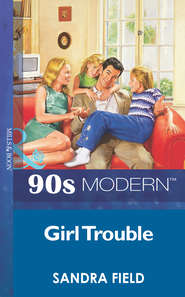По всем вопросам обращайтесь на: info@litportal.ru
(©) 2003-2025.
✖
Honeymoon For Three
Автор
Год написания книги
2018
Настройки чтения
Размер шрифта
Высота строк
Поля
In a leisurely fashion that stopped just short of insult, Slade let his eyes wander over her face. Her lashes were thick and dark, and many a model would have paid a fortune to have her cheekbones. Quelling a crazy impulse to wipe the tiny fleck of lipstick from her tooth, and thereby feel the soft curves of her lips beneath his fingertip, he said abruptly, “What about the other property? On Cornell?”
“There are a couple of old people’s homes near that corner, as well as some low-rental housing. It could be made into a small park with benches, flowerbeds and shrubs—there are already three fine maples there for shade.”
“You design it and I pay—is that the deal?”
Her nostrils flared. “There’s no need to be gratuitously offensive, Mr. Redden.”
“You can always leave,” he said evenly.
“And then kick myself for the next month because I gave up too easily? No, thanks!”
He was only confirming what he already knew. “You really do want these projects to go ahead, don’t you?”
“Of course I do,” she snapped. “I wouldn’t be here otherwise—I already told you my time is valuable.”
“So what would your contribution be?”
“If you donated the properties to the city on the condition that they be kept as a garden and as a park respectively, I’d provide the design, the plants and the labor.”
He raised his brow. “That’s exceedingly generous of you... What’s your motive, Ms. Haines?”
She said pleasantly, “It’s been a long time since I’ve met a man who riled me as much as you do. Could my motive possibly be altruism? Or won’t that wash?”
She hadn’t left his office and she hadn’t backed down. “Nope,” he said. “Altruism, in my opinion, doesn’t exist.”
“I would consider that statement arguable.” Her smile was consciously provocative. “How about enlightened self-interest? Are you more susceptible to that?”
“You’re getting closer.”
“I’m a quick learner. As for my motive, I get the pleasure of seeing worthless land made both beautiful and useful. How will that do?”
“It’s going to cost you.”
“I can afford it.”
“I hadn’t realized landscape design was so profitable.”
For the first time he saw that he’d got beneath her skin. “The source of my money is none of your business,” she said shortly. “I can afford it. That’s all you need to know.”
“I’d need documentation to that effect before making any commitments.”
“You’ll have it.” She swallowed, feeling tension tighten her jaw. “Are you saying you’ll consider my proposal?”
“I’m free tomorrow morning between ten and eleven-thirty—that should be enough time to check the sites out.”
“I have an appointment at nine. I could pick you up outside your office at ten-thirty.”
I have a life too; that was what she was saying. He grinned at her. “I’ll be there. Bring your plans.”
“Thank you,” she said blandly. “Let me give you my business card in case there’s any change in the time.” Stooping by her chair, she extracted a neat green and beige card and passed it to him. Making no attempt to hide the sardonic note in her voice, she added, “It’s been a pleasure meeting you, Mr. Redden.”
“Likewise, Ms. Haines,” Slade said, and took her coat from the hook, holding it for her. Her hair was pulled into a knot at her nape, long hair the colour of polished chestnuts; again her scent drifted to his nostrils. It was a long time since he’d been so aware of a woman, so awake to every tiny detail ... a very long time.
Quickly Cory shrugged into her coat, not wanting to prolong the contact of his hands on her shoulders. She turned to face him. “I’ll see you tomorrow,” she said.
Suddenly resenting her level gaze, Slade said, “I’m sure you’ll understand that I’ll be running a routine check on your business between now and then.”
“I wouldn’t expect otherwise.”
Irritated out of all proportion, he swung the door open. Mrs. Minglewood looked up, her bright blue eyes openly curious in a way that did nothing to improve Slade’s mood. Without watching Cory Haines cross to the elevator, he shut his door smartly. He’d get Mrs. Minglewood to pull the files on the two properties and to check out Haines Landscaping later on. Right now he needed to put an interview that had been as frustrating as it had been interesting right out of his mind and concentrate on the plans for the waterfront.
But the printouts failed to hold his interest. Restlessly he strode over to the window. The rain had changed back to snow, big wet flakes falling from a sodden sky. It was time he went back to Toronto, he thought moodily. Back to his head office and his apartment and his friends.
Maybe he’d go and see his mother after work. She always cheered him up.
Delicate and elusive, a woman’s scent hung in the air, mocking him with all that was missing in his life.
Lavinia Hargreave had remarried after Slade’s father had died of a heart attack: an odd death, Slade had often thought, for a man who had given little evidence of having a heart. His memories of his father were of lacks and absences, of coldness and distance, of a quintessentially military man, phobic about emotion and intimacy.
In consequence, Slade had been happy when his mother had married Wendell Hargreave, a retired and rather famous antiquarian bookseller who loved poetry and gardening. Lavinia had blossomed in the eleven years they had been together, and Slade had genuinely mourned Wendell’s death, ironically also from a heart attack. Wendell and Lavinia had owned fifty acres on St. Margaret’s Bay; only two weeks ago Lavinia had rented it to a university professor and his family and had bought herself a small bungalow in the city. Because she was only gradually getting settled, he’d decided to stay in a hotel this trip.
She opened the door to her son and ushered him in. “You look tired,” she said.
He flicked a glance at himself in the ornate antique mirror that overpowered the narrow hallway. Dark brown hair with a tendency to curl, gray eyes, cleft chin—he’d seen it all a thousand times and had never understood why women—secretaries, sophisticates, and sweet young things—all seemed to find him irresistible. “I need a shave,” he said.
“You need a holiday,” she said tartly. “You work too hard.”
They had had this discussion before. “Yes, Mum,” he said, kissing her cheek. “You should sell that mirror; it doesn’t suit the house.”
“The house suits me and the mirror stays. Wendell was very fond of that mirror.”
Without asking, she poured him a Scotch and water. Taking a hefty gulp, Slade broached something that had bothered him ever since he’d arrived in Halifax last week. “You could have bought a much bigger house than this, Mum—you didn’t even touch that account I set up for you.”
Lavinia added a generous dose of Coke to some dark rum; the rum, she always said, was the excuse to drink the Coke. Smoothing down her flyaway white hair, she said, “You know me—I’m much too strong-minded to be dependent. And far too old to change.”
“I hope you didn’t rush your decision to move.”
“I wanted to do it before I was forced to, Slade. Retain an element of choice. There are no stairs in this house, and I’m near a library, a bookstore and a delicatessen. Plus I can take a cab to the theatre and the symphony.” She raised her glass in a toast. “I’m really very happy here. Have some chips.”
Lavinia didn’t believe in cholesterol. He took a handful, smiling at her affectionately, recognizing as always how grateful he was to her for giving him unstintingly the love his father had withheld. “You’ll have to do something with the garden.”
“Sod it.”
“I beg your pardon?”
“Grass, Slade. Grass. No fuss, no muss.”
“But you had such a lovely garden in Seaview.”











